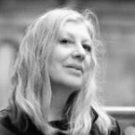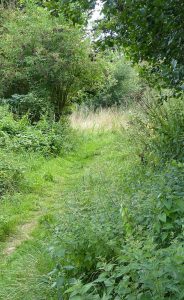Elizabeth Baines is the author of two collections of short stories, Used to Be and Balancing on the Edge of the World, and two novels, Too Many Magpies and The Birth Machine, all published by Salt.

The Meadow
by Elizabeth Baines
Do you remember the meadow? There was a lane between high hedges, which opened out to a big ploughed field; the lane skirted the field and dived again on the far side into a hedge and over a stile. And there was the meadow, hushed and enclosed between cushions of hawthorn and a stream with a coppice, yellow with cowslips in spring.
You were crying once I remember, something had upset you, but when you got to the top of the stile and saw the cowslips, you stopped, you forgot – I can see you now, clambering down, skinny legs, bony brown knees, your plaits flying as you swooped on the flowers. You could pick them in those days, wild flowers weren’t endangered, or no one had guessed that they were. You buried your face in the bunch in your hand, the froth of little golden cups, each with a neatly red-dotted centre, the furry pale grey-green stems, the peppery, creamy scent.
It was our retreat, that meadow. There were things to retreat from. You could get the cane in school, remember, and our dad spent his days digging holes for foundations for houses, it wasn’t easy to make ends meet and things were hard at home. There were holes in my shorts and you were wearing my handed-down cardi as you jumped from the stile.
Remember the toadstool fairy rings in autumn? The hedges hung with red jewels, the flash of kingfisher blue in the coppice?
We moved away, though, we couldn’t go any more to the meadow: our father got a better job elsewhere with the house-building firm. Life improved. We were grateful, we were glad. We no longer needed a place to escape to.
And we grew up, didn’t we? We understood and embraced the notion that people, like our father, need jobs, and the houses he helped build. We understood that society needs to progress. We learned to live in the present, not to be sentimental or backward-looking.
Years later, one day I went back. I walked the road that had once been the lane, through a sea of pink brick that was once the ploughed field. Sun glared off big cars parked on brick-paved drives, picture windows stared out, blank and bland.
They must have culverted the stream. My bearings had gone. I couldn’t find where the meadow had been.
But in my dreams now I walk the gone meadows. Rare nesting birds fly up as I go, the air is heady with scents and trembling and folded by butterfly wings, and I’m searching for something, something else that I lost long ago.
